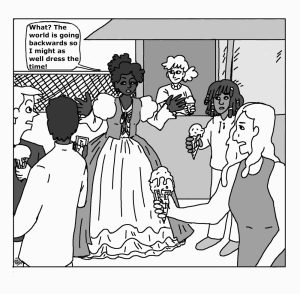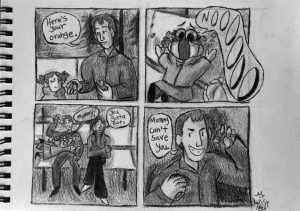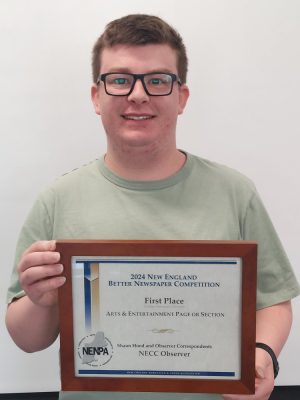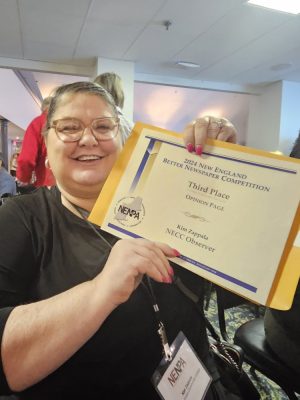




Student journalists from the NECC Observer recently won awards from The New England Newspaper and Press Association in the college division of the Better Newspaper competition.
Shaun Hood of Groveland and Observer correspondents received a first place award for best arts and entertainment section and former Observer Editor-in-Chief/Opinion Editor Kim Zappala of Haverhill won a third place award for best opinion section. The awards were announced at NENPA’s annual convention March 29 in Portland, Maine.

The awards honored work produced and published in the student newspaper the NECC Observer during the 2023-2024 school year. This is the second year in a row that Zappala won a NENPA award. In 2024 she won second place for best opinion section. Zappala graduated from NECC in May, 2024. She is now studying journalism at UMass Lowell. The Observer staff members were competing against students from colleges and universities throughout New England. Finalists in their categories included students from New England College, Bowdoin College, University of Southern Maine and Quinnipiac University.
“Congratulations to Shaun and Kim and the journalism students who contributed to the arts and entertainment section. These awards are a testament to the hard work the students put into the Observer and their dedication and commitment to the craft of journalism and to the student newspaper,” said Mary Jo Shafer, NECC Journalism/Communication program coordinator and faculty adviser to the NECC Observer. “Shaun puts incredible effort, thought, planning, care and creativity into his stories and page. Kim is dedicated, passionate and diligent in digging for facts and presenting engaging and informative opinion. I am so proud of Shaun and Kim.”
Shafer said she also is pleased to see the contributions from students in Journalism I and II classes honored because the Observer appreciates their submissions. “I think it’s a nice acknowledgement of our students who consistently write interesting, informative, engaging and relevant stories and who have lots to say and share about arts and entertainment topics,” she said.
Several other student journalists from NECC also attended the annual two-day conference, attending workshops on topics including interviewing techniques, public records, media law, artificial intelligence, fact checking, writing tips podcasting, investigative reporting, gender and local news and more. Students also attended a town hall focused on the First Amendment. The March 29 keynote featured artist Alexandra Bell, who led a session on rethinking and revising news coverage to promote fairness and accuracy.
To learn more about NECC’s Journalism/Communications program, visit the website or contact Shafer at mshafer@necc.mass.edu.
To The Staff of The Observer,
As an NECC faculty member, I express my solidarity with students who are advocating for more support from college leadership around the issue of food insecurity. I have two overlapping concerns. First, I also would like to see more attention to food access on NECC’s campuses. Second, more broadly, I see a need for better communication from college leadership.
NECC leadership rightfully reminds its employees to address the whole student. At convocation, college-wide meetings, and Professional Day, awareness of students’ life situations is emphasized, and responsiveness is encouraged. Currently, many NECC students are unfortunately experiencing food insecurity, and that is a big barrier to learning. While colleges cannot completely “solve” the problem, they can do something.
Something is better than nothing.
When students, faculty, and staff learned about the termination of a social worker last spring and voiced our concerns about the future of services to students, including food access, we were told that services would not be diminished but would instead be provided in a different way. I was told that I was mistaken in my concern. It was difficult to believe leadership’s reassurances, though, because information about a new plan was vague and piecemeal. It seemed improvised.
Now, a year later, I understand that providing food access on campus is not a priority for NECC leadership and that they aim to make a greater impact in other ways, such as increasing Federal Pell Grants. It would have been helpful to hear this rationale earlier in the conversation. I understand that there cannot always be transparency in an institution, but currently there is very little or none, and NECC can do better. For example, when the Haverhill food pantry was dismantled last September, college faculty and staff were not informed ahead of time and instead learned the news by word-of-mouth after the fact. No one enjoys delivering bad news, but it would have been more respectful in this situation.
I understand that leadership needs to choose how they direct limited time and resources. Still, I think that NECC can and should do something to address food access on campus, even if it is not a priority. Students have identified this issue as their priority.
Our peer institutions, like Bunker Hill Community College and North Shore Community College, have robust food access programs. I think that we can operate on par with them.
Genuine expressions of concern are acts of optimism. In other words, if people like me didn’t think that our institution could continually grow and change and improve, then we wouldn’t speak up about the challenges. I hope that this can be a turning point for improved communication and student support at NECC.
Sincerely,
Michelle Carter
Professor of Art & Design